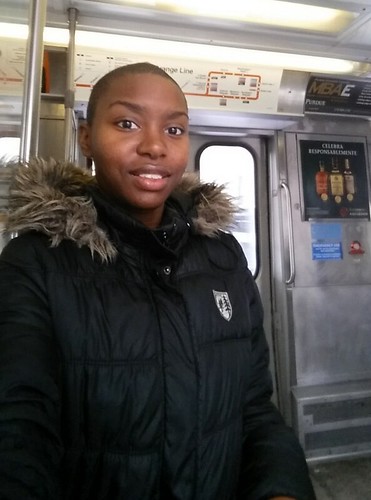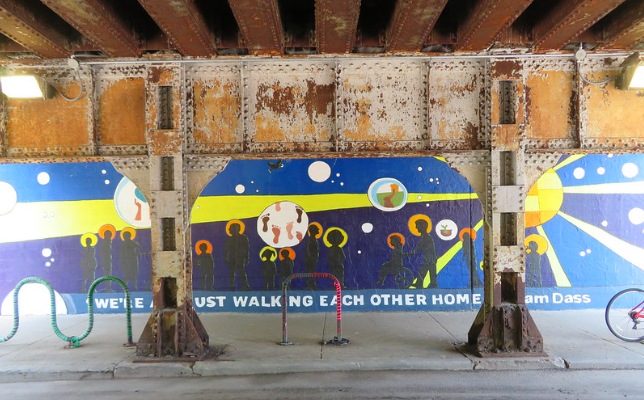In the time that I've lived near the lake in Rogers Park, it's always struck me as perverse that there are rows of free storage for cars, empty metal boxes, alongside it. I often wonder if my neighbors make the connection between their transportation choices and the soil erosion on the lakefront, among other climate change effects. Transportation is the number one source of emissions in Chicago and the United States. Specifically, more than half of Illinois’ transportation related emissions are coming from Cook, DuPage, Kendall, Will, Kane, McHenry, and Lake county according to the Chicago Metropolitan Agency for Planning. Chicago and its surrounding areas do not have to wait for the state to take action in order to before taking more serious steps to address climate change.
This summer I read that the city of Vancouver changed their deadline for achieving two-thirds of all trips in the city by walking, biking, and public transit to 2030 instead of 2040. I felt a mix of emotions while reading this: hopeful because some cities are realizing just how quickly we need to act to mitigate climate change, and also angry that the city of Chicago and the state of Illinois are not pursuing similar targets around sustainable transportation.

Most of the conversation elected officials are having around climate change in Chicago and Illinois is focused around clean energy. Clean energy is a great goal but if the majority of residents of Illinois residents continue to use single passenger vehicles to move around it clean energy won’t make much of a dent in reducing our emissions. Additionally, I have not read anything regarding penalties for city or state agencies for not reducing emissions. It will be us who will pay the consequences: extreme weather events, reduced viability of farmland for our food, worse air quality, loss of animal diversity, etc.
Curious about what the state of Illinois has its website about the subject, I went to the “Climate Change in Illinois” page and did not see transportation listed as a sector where the state is committed to taking action when it comes to climate change. We are headed in the opposite direction of reducing transportation related emissions by expanding highways and funnelling the majority of transportation funds into car-centric infrastructure. The Illinois Department of Transportation estimates that since 2015, annual vehicle miles traveled in Chicago have increased 5 percent.
Despite California’s image as a very car-centric place, the state is committed to reducing its transportation-related emissions. While California is not meeting their transportation-related climate action goals, it actually has climate action goals and is actively pursuing meeting them, albeit imperfectly. Of course it's not perfect but California offers a model for Illinois and other states to follow regarding climate action.
Out of curiosity I searched out IDOT’s website to find a mission statement or something similar. I was struck by their stated goal to ensure that destinations are reached “in the safest, quickest, easiest, and most comfortable and cost-effective manner.” As evidenced by three agency's past roadblocking of protected bike lanes and lack of vision regarding bus-only lanes on state controlled roads, safe, quick, and easy travel via sustainable modes does not seem to be a priority for the department. What would a state, city, and county transportation system look like if it was designed with climate change in mind?
The city of Chicago and the Chicagoland region can do more to promote and fund sustainable transportation. A few ideas:
- Gradually begin to equitably charge for residential on-street parking. Charge more for SUVs and trucks since they take up more space on city streets and present an increased danger for people on foot and bike.
- Inform residents in advance that residential parking will no longer be free for car owners and that in a certain amount of years they will have to pay to park on city streets. In the transition period, the city can begin to beef up transit service, namely through increasing bus frequency and creating more bus-only lanes to increase bus speeds and reliability. The city could start to charge for street parking in neighborhoods where there is a high number of transit options and gradually move on to neighborhoods with less transit access.
- Implement a climate tax on city stickers for SUVs and trucks.
- Implement a weight-based sales tax for vehicles sold within Cook County.
- Increase gas taxes within Cook County. Bordering counties are free to do the same in order to better fund Metra and Pace. Strategies can be developed to ensure that the tax does not burden low-income residents.
- Once we appoint a progressive commissioner for CDOT, they can lobby IDOT to create bus-only lanes. Sheridan Road north of Lake Shore Drive, for example, is IDOT-controlled. We could have a bus-only lane active during rush hour and perhaps mid-day based on current and projected ridership.
- Implement downtown congestion pricing with funds going towards sustainable transportation.
- Encourage interagency cooperation between Chicagoland transit agencies.
- Match transit funding to climate goals. For example, if Illinois set a goal to reduce vehicle miles traveled by 40 percent by 2030, 40 percent of the state’s transportation budget should support public transit and biking.
- The city of Chicago should create a goal for 80 percent of Chicagoans to live within a 10-minute walk of a high-frequency and speedy bus line.
- The CTA should create a rider's union, an organization made up of riders that can hold the agency accountable for improving service.
- Create a city-wide network of barrier-protected bike lanes.
What would you want to see the city, county, or state do to align our transportation system with the realities of climate change? Let us know in the comments.






